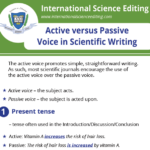Wordy text can be difficult to read. In this blog, we discuss ways to reduce wordiness in scientific writing, using real world examples from papers edited at International Science Editing. Look for synonymous words People use social media to share their views, thoughts, and opinions. People use social media to share their views. Views, thoughts, […]
“We are studying a narrow field and we disagree with previous research results. How can we report this?”
This question was asked in the Q&A session of an online talk presented by International Science Editing. In this blog, we discuss how to respectfully dispute the findings of others. Acknowledge the good Begin by acknowledging what you liked. Rarely is a paper so poorly written that you cannot find a single aspect to commend. […]
Would a lottery system improve #TrustInPeerReview?
An increasing number of agencies are using lottery systems to distribute research funding. Supporters of the approach have even suggested lotteries could be used by journals to select which papers to publish [1]. In this blog, we discuss how this would potentially work, and look at the pros and cons of such a system. How […]
Active versus passive voice in scientific writing (infographic)
In this infographic, we discuss the use of the active and passive voice in scientific writing. The infographic contains the following text: The active voice promotes simple, straightforward writing. As such, most scientific journals encourage the use of the active voice over the passive voice. Active voice – the subject acts. Passive voice – […]
How to write an introduction to a research report
In this blog, our guest blogger, Professor Emeritus Dolores Takemoto from Kansas State University discusses how to write an introduction. A thorough introduction is a necessary prerequisite for the most effective presentation of your research results. In addition, it optimizes your chances of getting your research report accepted for publication by a journal. Before you […]





